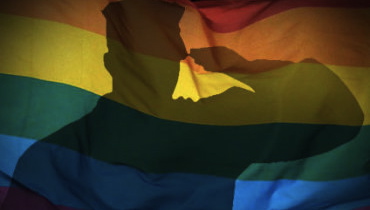
NCLR Guest Columnist
Year: 1995
After an hour and a half of grilling me about my relationship with a male cadet, the major allows me to leave.
“Aaarrrggghhh!” I let out a roar from the depths of my soul. I’m crazy mad and full of adrenaline. I want to bite the major’s head off, chew it up, and spit it on the ground. The bastard! How could he do that to me? I have worked so hard for this place.
When I get back to my dorm room, the girl is there. One look at me, and she keeps a safe distance. I tell her what happened. Blow-by-blow. My feelings of rage. Indignation. Violation.
After my tirade, I sit down on the bed. She cautiously approaches, and puts her hand on my back. Her comforting touch sends me over the top, and I start crying uncontrollably.
~~~
When I was young, I had a recurring dream. It’s nighttime in the dream. The moon is bright, and shining on the black ocean water. The waves are calm. I’m lying on my back, almost on top of the water. Beneath me are letters of the alphabet—big ones, pushing me up, keeping me from sinking into the ocean. I can’t make out the letters, but I’m certain they spell “America.”
In moments of darkness, when I think about the unfairness of life, I go back to the dream. I tell myself, “Quit feeling sorry for yourself. Suck it up. You are lucky to be alive, to live in this country.” And I also remind myself that I’m here for a reason. Thousands died trying to get here, but they didn’t die for nothing. They died so that I and others could live, and experience what they couldn’t—a life free from government oppression. The freedom to think what you want, say what’s on your mind, and be around whomever you choose.
Essentially, the freedom to be yourself. That’s what America represented to them. And that’s why they were willing to risk their lives to be free. I never fully understood it, until now.
The irony. Why can’t I, or any gay soldier, share in those freedoms? We’re willing to die to protect this great country. And to those who would deny us full citizenship—we’re also willing to die to defend your asses, your freedoms, and even your right to go to the ballot box or court to hoard those freedoms for yourselves, and not share them with us. And here’s the kicker. It’s a doozy. You also made the law so that we can never defend ourselves. Can never call you out on your selfishness. Can never lead full lives. Because if we dare to do so, you will take everything—years of blood, sweat, and tears—away from us. You’re freaking brilliant. Give yourselves a pat on the back for being such greedy bastards. And, for being so incredibly un-American.
I can’t live like this. No honor, integrity, or dignity. But whatever I do, this I know: I wasn’t saved from the ocean only to be swallowed by fear.
~~~
The girl holds me in her arms until I stop crying. Unprompted, she tells me, “I’ll do whatever you want me to do. If you want me to go back in the closet, I will do that.”
I don’t respond. I’m emotionally exhausted. Seeing this, she begins to sing a song from the musical, West Side Story:
There’s a place for us,
Somewhere a place for us.
Peace and quiet and open air
Wait for us
Somewhere.
. . .
There’s a place for us,
A time and place for us.
Hold my hand and we’re halfway there.
Hold my hand and I’ll take you there
Somehow,
Some day,
Somewhere.
`
NCLR Guest Columnist Huong T. Nguyen has shared her military dismissal under “Don’t Ask, Don’t Tell” through her weekly diary blog series. Read Part One: Where There’s a Will, There’s a Way, Part Two: Light Bulb, Part Three: A New Identity, Part Four: The Education of Private Nguyen, Part Five: The Girl, Part Six: No Air, Part Seven: The Truth Will Set You Free, Part Eight: The Trial, Part Nine: The Story, Part 10: There’s A Place For Us, Part 11: The Repeal: No One Left Behind,and Finale: Don’t Ask, Don’t Tell”: In the Olden Days.
`
Nguyen is an attorney in the San Francisco Bay Area, where she resides with her wife and two children.









